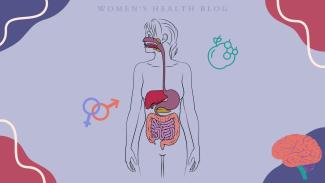Author: Avril Metcalfe-Roach, PhD student, University of British Columbia | Editors: Negin Nia and Arrthy Thayaparan (Blog Coordinators)
Published: November 12th, 2021
If you had to build your own house from scratch, what supplies would you bring to the job? High-quality building materials would certainly make the house much more durable, and having a diverse array of tools on hand will make construction much easier.
Joe, on the other hand, brought just four zip ties and a wrench and is probably in for a tough time. If you live in a hot climate, you might consider installing air conditioning; in cold climates, good insulation and a heater will help you avoid freezing during the winter. In any case, putting love and effort into the home helps ensure that it keeps you comfortable for many years.
Similarly, the food we eat directly impacts every facet of our health. The links between diet, obesity, and cardiovascular disease are well known. However, more research indicates that dietary habits also directly impact issues like cancer, mental health, and even neurodegenerative diseases, including Alzheimer’s and Parkinson’s disease. Healthy eating can also indirectly reduce disease burden by ensuring that your body has the tools it needs to heal and combat infection.
So, how do different foods actually exert these effects?
Each food, of course, has a different nutritional profile and will provide your body with different tools. We can anticipate what tools we will need and provide them before problems arise. For example, people who menstruate require more iron in their diets, and oral contraceptive use can lower the absorption of multiple vitamins and minerals.
Humans also have a little problem: we’re more complex than our genetics allow. While our bodies directly absorb and create many nutrients, a lot of essential nutrients are created solely by the 100 trillion bacteria living in our intestines. In exchange for some energy and a warm place to call home, these beneficial bacteria help to prevent other harmful bacteria from infecting the gut. This keeps our gut tissue working properly, and produces vitamins and other compounds that can leave the gut and promote health throughout the body. For example, certain types of fiber are broken down by bacteria into molecules that enter the bloodstream and help to reduce inflammation.
Even the ‘happy’ chemical, serotonin, is mostly produced in the gut. Like us, each type of bacteria has its own nutritional requirements that mostly revolve around fiber-rich foods such as fruits and whole grains. By eating a variety of nutrient-dense foods, we foster a gut environment full of healthy, anti-inflammatory bacteria that in turn keep us healthy.
What type of diets are sustainable and have health benefits?
Dietary research is progressing at a staggering rate, and it can be overwhelming to stay up to date. When the research is clarified, however, certain dietary patterns emerge that are consistently linked with specific health outcomes.
The Mediterranean diet, which promotes plant-based foods, fish, and healthy oils, while limiting red meat and other animal products, is perhaps the best-studied healthy diet in the world. It has been associated with lower rates of cardiovascular disease, obesity, glucose sensitivity and diabetes, and overall mortality.
More recently, a few studies have suggested that the Mediterranean diet may improve brain health. Neurodegenerative diseases are not yet well understood, and there are very few known factors that help to prevent them. Recognizing this, Dr. Martha Clare Morris unveiled the MIND diet in 2015, which optimizes the Mediterranean diet against cognitive decline.
What is the MIND diet and how does it benefit us?
Most food groups are conserved between the two diets; crucially, however, the MIND diet also promotes brain-healthy berries and leafy greens, while restricting pro-inflammatory sugary, fried, and processed food. These latter foods are becoming increasingly common, especially in North America; some research suggests that their overconsumption can even negate some of the health benefits normally associated with the Mediterranean diet.
As a result, the MIND diet has since been associated with significantly reduced rates of many neurodegenerative diseases, including Alzheimer’s, cognitive decline, and general motor decline; what’s more, the strength of these associations seems to exceed those of the Mediterranean diet.
We recently investigated the MIND diet in a group of individuals with Parkinson’s disease, where we assessed their normal dietary intake and assigned a score based on how closely their intake resembled the MIND diet. Female participants had higher scores on average, indicating closer MIND diet resemblance. Participants with high scores developed Parkinson’s disease significantly later than those with low scores; unexpectedly, this association was especially strong in the female participants, where dietary habits accounted for up to 17 years’ difference in disease onset. Interestingly, the MIND diet accounted for only 10 years in men, and the Mediterranean diet accounted for 10 years with no apparent sex differences.
How do these diets work exactly?
While the complexity of these diets means that it is difficult to know exactly how they work, a sizable amount of research has zeroed in on our microscopic friends as a key factor. Brain-healthy diets help anti-inflammatory bacteria to thrive, which may help to limit inflammation in the brain. Regulation of the immune system is known to be partially sex-specific – for example, women are more prone to autoimmune disease, where the immune system attacks healthy body tissue – and these differences might impact how effective the diets are against neurodegeneration. Indeed, women make up only 1/3 of all Parkinson’s disease cases.
While our findings here are only correlational, they highlight the importance of including sex as a factor in further research. With a strong enough framework, everyone can design a house that will keep them happy and healthy for a lifetime.
